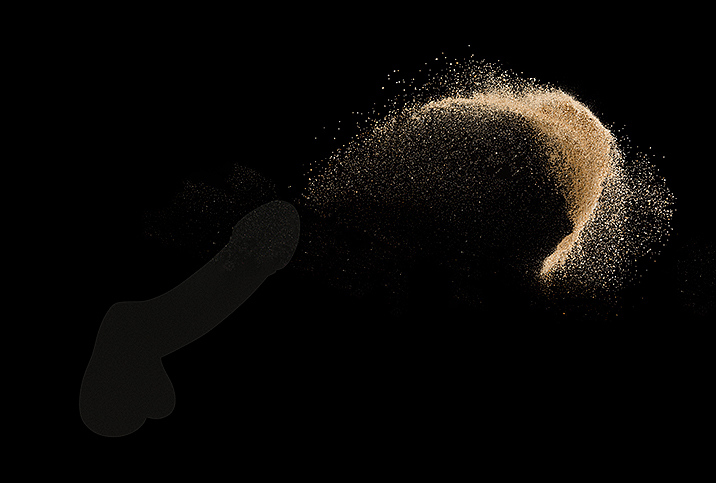Do You Know These 6 Facts About Semen and Ejaculation?

Ejaculation might not be as astonishing as childbirth, but it's much more complex than it appears on the surface. Just producing and preserving sperm involves several different body parts and processes.
The fluid that makes up semen, which is also referred to as ejaculate, comes from different places, too. Then there's the delicate mind-body dance required to produce an orgasm and ejaculation.
Find out six facts about ejaculation and semen that may surprise you.
Semen Fact #1: You're never too old to ejaculate
"Ejaculation is a reflex tightly tied to the nervous system," said Paul Turek, M.D., a urologist in California and a medical advisor for Progyny, a provider of employee fertility benefits. "For the most part, if the nervous system is functional, ejaculation should be intact."
Michael Werner, M.D., the medical director and founder of Maze Men's Sexual & Reproductive Health in New York, added that as men get older, they need more stimulation to ejaculate. Many older guys can't ejaculate through vaginal or anal intercourse and may need to rely on masturbation or manual stimulation from a partner.
"We can always manage erection issues. If you have a penis, we can get you an erection. But now we're reaching a point where a lot of men are getting erections when they're older but having difficulty reaching a climax with intercourse," Werner explained.
While it's a complex problem to treat, he suggested men talk to a doctor, because there are medications and behavioral techniques that might help.
As men age, ejaculate volume often diminishes as well. Certain conditions that are more prevalent in older people, such as diabetes and prostate issues, can affect ejaculation and semen quality. Some medications, such as alpha blockers, can also impact ejaculate.
Semen Fact #2: Orgasm and ejaculation aren't the same
Usually, orgasm and ejaculation occur simultaneously, but they're not synonymous.
"Orgasm is a cerebral event associated with the ejaculatory reflex," Turek said. "It is neurotransmitter and hormonally based. You can orgasm without ejaculation and can ejaculate without orgasm."
Spinal cord injuries are a common cause of ejaculation without orgasm.
Retrograde ejaculation—when the semen goes back into the bladder rather than out of the penis—can occur when the body has difficulty automatically closing the bladder neck. This situation can happen due to neurological or physical issues, or as a side effect of certain medications, including some antidepressants and drugs used to treat high blood pressure or prostate conditions.
Werner said there are also people who, for reasons unknown, don't experience orgasm during climax.
"I do have a group of men—and they're very difficult to treat successfully—who do not get that intense pleasure from reaching a climax," he said. "They're doing everything mechanically right. Their body is reaching a climax. They're pushing the fluid out, but they just don't register an intense orgasm."
In these instances, increasing testosterone is usually the first-line treatment, Werner explained. He sometimes also prescribes PT-141, a peptide hormone treatment that is off-label for men, or bupropion (brand name: Wellbutrin), an antidepressant that lowers the threshold for ejaculation and can intensify it.
Semen Fact #3: Food might affect the taste of semen
"Research is scarce on this issue, but my sense is that any food byproduct that gets into body secretions, like sweat or urine, might also find its way into seminal vesicle secretions, the main component of semen," Turek said.
Various elements in semen, including hormones, carbohydrates, acids, lipids, vitamins, minerals and proteins, affect its natural taste, according to Justin Dubin, M.D., a urologist and men's health specialist with Memorial Healthcare System in South Florida. For example, the taste tends to be slightly bitter because semen is alkaline to protect sperm from the vagina's acidity.
Fructose, a sugar that gives sperm energy, lends a bit of sweetness. Vitamins and minerals such as zinc and calcium add a slight metallic tinge.
Foods like pineapple, which are acidic and have a high sugar content, can increase fructose levels in the body while neutralizing semen's alkalinity, Dubin said. The result could be semen that's sweeter and less bitter, though there's no hard evidence to support this possibility.
Other fruits and spices that might produce a similar effect include lemons, cranberries, kiwis, peaches, dates, blueberries, wheatgrass, cinnamon and parsley.
Semen Fact #4: Some people are allergic to ejaculate
Semen allergy, also known as human seminal plasma (HSP) hypersensitivity, is thought to affect up to 40,000 women in the United States. People with this condition aren't allergic to sperm, but to other substances in the seminal fluid.
"There's a couple of case studies in the literature of women diagnosed with it, but it's very uncommon," Dubin said. "These women present with itching and swelling at the site where they came in contact with the semen, and also whole-body hives."
Semen Fact #5: Semen color can change over time
Semen is typically gray or off-white and opalescent, but it's normal to see some slight variation from day to day or gradually over time.
Mild, gradual yellowing of semen, for example, can occur with age or prolonged abstinence. A slight yellow-orange tint to your semen might be attributable to certain antibiotics or specific food and drink dyes.
On the other hand, abnormally thick and intensely yellow semen could be a sign of an infection, especially if it is accompanied by a pungent or sour scent.
Another semen color to keep an eye on is red, indicating blood in the ejaculate, known as hematospermia.
"Hematospermia is mostly benign but can indicate infection or cancer in a small percentage of cases," Turek said.
Werner said hematospermia usually goes away on its own and shouldn't cause too much worry, especially for younger men without a history of cancer. But older men or those who experience prolonged hematospermia should see a doctor.
"If you think about ejaculation, it's a very forceful activity. You're pushing that fluid out, so it can irritate any part of that tract: the seminal vesicles, the prostate, little blood vessels in the urethra where the prostate is. So they can bleed a little bit," he said.
Dubin said beets can also turn semen temporarily pink or red, though it's rare.
6. Holding back has its drawbacks
Proponents of semen retention—the practice of withholding ejaculation for days or weeks—claim it can improve energy levels, focus and memory, among other benefits.
Scientific evidence to support any psychological or cognitive benefits is scant.
Plus, there are downsides, including a potential reduction in fertility and an increased risk of prostate cancer.
"We do know there are benefits of frequently ejaculating," Dubin said. "Withholding your seed, especially if you're trying to conceive, is not ideal."
A 2018 study published in Andrology supports this view. Researchers evaluated 800 men in an in vitro fertilization (IVF) clinic and found that retaining semen for more than four days adversely affected sperm DNA and implantation success rates. Dubin, who was not involved in the study, explained that the reason for this finding is essentially because frequent ejaculation replaces old, potentially compromised sperm with fresh swimmers.




















